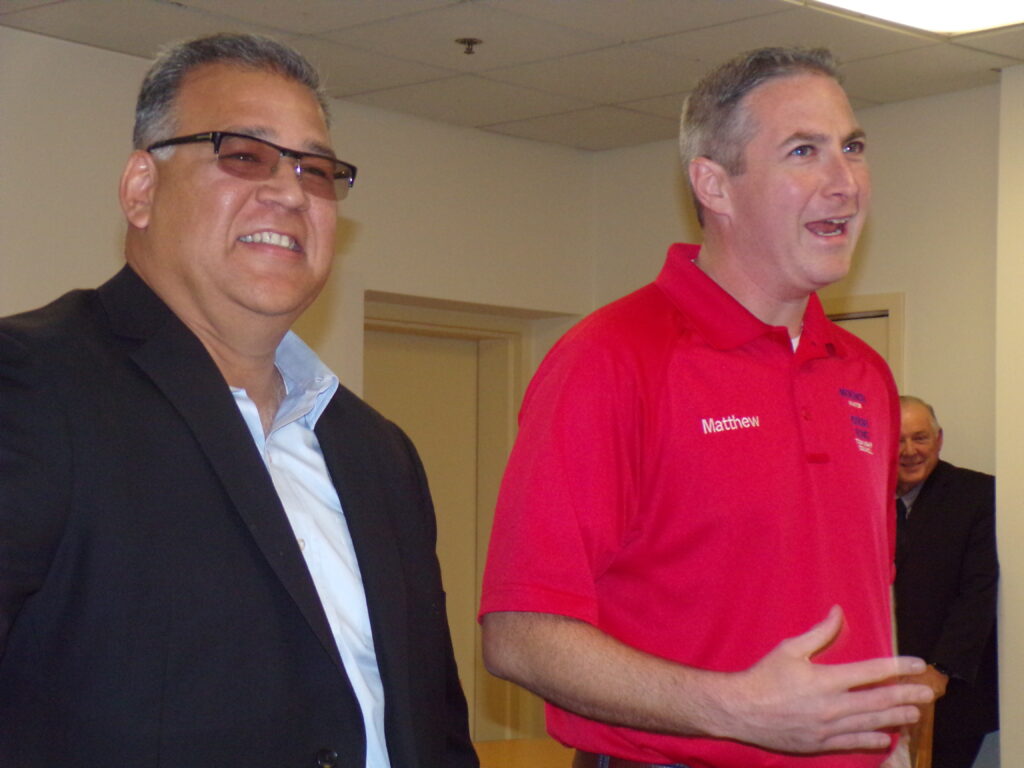Steinhardt Deserves the Credit for GOP’s Mini-resurgence

With a gain of one seat in the Senate, two in the Assembly and two more in dispute*, Republican State Chairman Doug Steinhardt was justified in taking a victory lap, but he could have been equally jubilant in the significant step taken toward restoring the organization he heads to its rightful role of Republican State Committee, rather than its eight-year run as the Chris Christie Party.
Under the former governor, the state party played a subservient role, its fortunes and viability linked directly to Christie’s, rising or falling in direct proportion to his. The cult of personality overwhelmed the traditional mission of the state party and served largely as an extension of Christie’s ambition.
The Assembly elections, while an imperfect bellwether on which to predict future electoral success, was invaluable in re-establishing the party’s identification and re-asserting its position as a political institution devoted to advancing principles and an ideology and promoting candidates who shared that goal.
While the Republican gains were modest, the pre-election consensus identified a number of Republicans who were vulnerable and raised the possibility that the party would lose seats in a low turnout off-year election.
They held them all in the face of spirited and well-financed Democratic opposition while producing upset victories and brightening the outlook for 2021 when a governor and Legislature will be chosen.
Steinhardt deserves the credit for the party’s mini resurgence, having assumed the leadership of a demoralized and financially strapped organization within weeks of the landslide defeat of the party’s gubernatorial candidate and still reeling from the damaging effects of the Bridgegate scandal.
He inherited a party which had fallen into irrelevancy and whose fiscal status was imperiled by bankrolling expenses associated with Christie’s ill-advised quest for the Republican presidential nomination and by legal costs incurred by those caught up in the Federal investigation of Bridgegate.
Steinhardt, in sharp contrast to his predecessor, was relentless in re-building the party structure, raising money, nurturing the grassroots and raising his profile as the outspoken leader of opposition to the policies of Gov. Phil Murphy.
Describing the election as the “Murphy midterms,” Steinhardt pounced on the governor’s words and deeds as out of step with taxpayer concerns and set the tone for Republican candidates — incumbents as well as challengers — to aggressively drive that message.
Republicans received some unanticipated help from Murphy himself with his stunningly tone-deaf suggestion that businesses or individuals considering locating in New Jersey should look elsewhere if their primary concern was the state’s tax burden.
While Murphy sought to soften the impact of the election results, his post-election declaration that “the party is stronger than before without question” drew more eye-rolling groans than nods of agreement.
Senate President Steve Sweeney (D-Gloucester) was especially critical, ridiculing the governor’s assessment that a loss of a Senate seat and at least two Assembly seats was a victory.
It was vintage Sweeney: “Are you kidding me? How do you spin that? It wasn’t a good day. This is the first net loss in the Senate in a decade. You can spin it however you want. We lost.”
He went on to lay blame directly on the governor, saying Murphy hurt Democratic candidates by spending the weeks leading up to the election talking about tax increases.
Not surprisingly, Steinhardt’s central role in the Republican show of strength attracted attention and speculation over a potential gubernatorial candidacy in two years.
The jockeying for position among Republicans mulling a challenge will begin in earnest at the turn of the year and a crowded field is likely — at least early on.
And, Steinhardt may very well be in the mix, reminding fellow Republicans that he led the party out of its moribund state, removed the Christie shadow, restored the state committee’s influence and defied the gloomy predictions of a diminished Assembly presence.
There are still Republicans in New Jersey who recall with fondness the heady days when the state party was led by strong personalities like Frank Holman and Chuck Haytaian, two of the most politically instinctive leaders in modern state history.
Steinhardt may have a way to go before reaching the Holman/Haytaian level, but he’s demonstrated his willingness to climb that mountain with the state party on his back if necessary.
Carl Golden is a senior contributing analyst with the William J. Hughes Center for Public Policy at Stockton University.
*Editor’s Note: As previously reported on InsiderNJ, with most VBMS having been counted in LD2, incumbent Dem Assemblyman Armato is up 435 votes, with Democrats cautiously optimistic. Armato’s running mate, Assemblyman Mazzeo, was the top vote-getter). There are still 400-500 VBMs to be counted, countywide, next week, along with the 2,000 provisionals.)












Leave a Reply